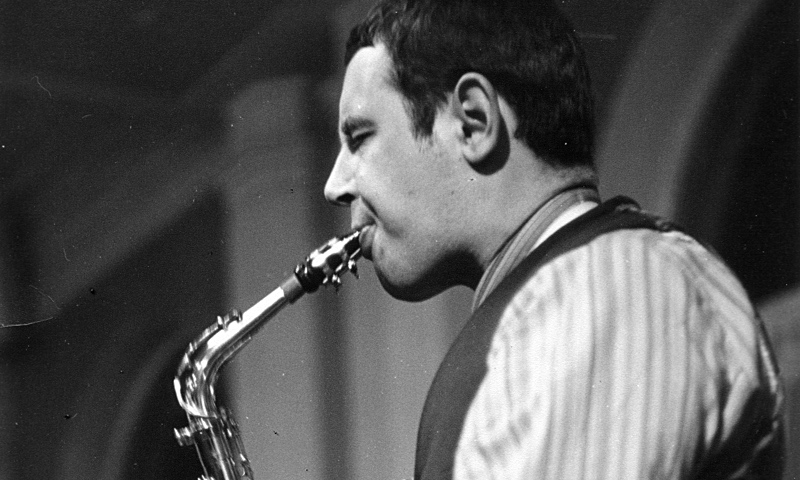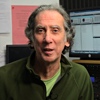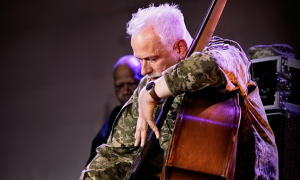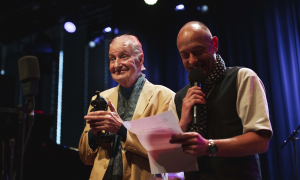Home » Jazz Articles » Profile » Mike Osborne: Force Of Nature - Part 1-2
Mike Osborne: Force Of Nature - Part 1-2

Mike Westbrook
composer / conductorb.1936

John Surman
saxophoneb.1944

Charlie Parker
saxophone, alto1920 - 1955

Billie Holiday
vocals1915 - 1959

Mike Osborne
saxophone, alto1941 - 2007
"Ossie" was one of the finest, and undoubtedly the most passionate and urgent of saxophonists Britain ever produced. Indeed, he stands comparison with the best players anywhere. On 19th September 2007, just nine days short of his 66th birthday, he died from lung cancer, but psychiatric problems (he had been diagnosed with paranoid schizophrenia in 1974) had prevented him playing in public since 1982. That year he returned to his home-town, Hereford, where he lived in care until his death. His friend Terry Evans kept him up-to-date on what was going on in the outside world, and helped support him with practicing: eventually Ossie was provided with a room in the care home where he could play, away from the residential part where his neighbours did not appreciate jazz. Some of his former colleagues visited him from time to time and even jammed with him occasionally, but there was never any real prospect of his returning to public performance. His recorded legacy covered just 15 years, and although he was moderately well-represented on disc during his lifetime a number of valuable un-released sessions have come to light since his death. I'll be examining his work with other people's bands and with his own remarkable groups in part 2 of this article, but for the moment I'll confine myself to a potted biography and some general comments on his music.
Michael Evans Osborne was born in Hereford on 28th September 1941. He went to school at Wycliffe College in Stonehouse, Gloucestershire, then, at 18, moved to London and the Guildhall School of Music. He had played violin in his school orchestra, but studied clarinet, piano and harmony at the Guildhall. He occasionally used the clarinet in ensemble work in later years but his primary instrument was always the alto once he had turned professional. In the spring of 1963, after sitting in with them a couple of times, he was invited to become a permanent member of the Mike Westbrook band when it reformed after moving from Plymouth to London. At that time he was one of only two full-time musicians in the band, joining an impressive reed section which included Surman. Westbrook says "He was way ahead of the rest of us in those days, the hippest person we'd ever met in terms of music and life-style. He was a major force in the band throughout the 60s. That period included the sextet's residency at Ronnie Scott's Old Place, the Little Theatre Club, a quartet and the first broadcasts and recordings"
From the mid-60s to the mid-70s Osborne cropped up in all sorts of bands and demonstrated that, although his sound had become harder and his style more challenging, he could make his mark in almost any context. He left Westbrook in 1972 to follow a solo career, but continued to play in several bands and was to be found in those led by Michael Gibbs, John Warren, Humphrey Lyttelton,

Alan Skidmore
saxophoneb.1942
Harry Miller
bassb.1941

Louis Moholo-Moholo
drums1940 - 2025
Chris McGregor
b.1936One of the most interesting and, certainly in the early-70s, most surprising bands Osborne was involved with was SOS, a trio comprising him, Surman and tenor saxophonist Alan Skidmore. Although ostensibly a saxophone trio, the sound was augmented by Surman's subtle and creative use of synthesisers, whilst Skidmore sometimes played drums. In 1974 S.O.S appeared at the Paris OpЁҰra, playing their own music for a Carolyn Carson ballet, Sablier Prison. I was during that period that Osborne began to show signs of mental distress, and on his return to England received the diagnosis of schizophrenia. He spent some time in hospital, and after that he only occasionally played in public. In 1982 he went back to Hereford, where he was often hospitalised and, finally, lived in care. He never played in public again.
Anyone who has had a relative or friend affected by dementia or some other condition that slowly but steadily steals their personality will know the grief of long drawn-out goodbyes. For Osborne's fans, the 25 years between his retirement from public performance and his death seemed very like that experience. We are all too familiar with the premature deaths of great artists, and the fruitless pondering over the "what ifs"—what if Charlie Parker had lived longer?; what would he have made of fusion or free jazz?; would John Coltrane have pursued the more reflective path of Expression rather than the apparent ferocity of Meditations. And so on. No doubt aficionados of all arts do this sort of thing—but in this instance the "what ifs" applied to someone still alive but unable to perform or, indeed, latterly not always able to recognise and communicate with visitors.
I saw Osborne play in numerous contexts, and have most of his official recordings plus as many airshots as I was able to capture from radio onto reel-to-reel tapes or cassette, but it was never enough. No matter how often you heard him, it was a fresh, energising and slightly alarming adventure. I have said, above, that he was a passionate and urgent player. It is difficult to describe him without one or other of these words. Westbrook says "His great strength. His single-mindedness, his total passion for playing jazz also made him vulnerable."

Barry Guy
bass, acousticb.1947

Evan Parker
saxophone, sopranob.1944
Dave Holdsworth
flugelhornOne of the last times I saw him play live was at the 100 Club on London's Oxford Street in May 1976. He was participating in a special evening celebrating

Stan Tracey
piano1926 - 2013
This was especially shocking since, just five weeks earlier, I had heard him with his regular trio, and he was on fine form then. In fact, his decline was by no means constant or consistent. Later recordings, including a session recorded in April 1981 by his quartet featuring Holdsworth, showed him improvising imaginatively and coherently, all his forces under control.
His involvement with the Tracey tribute was especially poignant as he had helped the pianist when, in the mid-70s, he became so despairing of the music scene and the neglect of jazz that he determined to retire from performance altogether. However, after playing a couple of sessions with Osborne, his pleasure in the music was re-kindled, and the two worked together as a duo under the name Tandem. Some of their superb work was captured on Original(on the Cadillac label) and Tandem (Ogun), recorded in 1972 and 1976 respectively. More recently (2015), Cadillac has issued a 45-minute improvisation from the duo, recorded in 1974. More on these, and most of the other recordings I have referred to, in the next instalment of this article.
After the news of his retirement it was difficult to come to terms with the thought that this unique saxophone voice was effectively silenced. His sound was hard yet emotional, his articulation incisive yet never clinically over-precise, his solos evidence of a mind brimming over with ideas, some (one might speculate with the benefit of hindsight) unbidden. He always played with passion and conviction, but from the mid-70s there was an increasingly urgent, often driven, quality, which may have been at least partly due to his psychiatric condition. In the notes to Force of Nature (Reel Recordings) Dave Holdsworth refers to this quality as "almost destructive" and reflects "The demands he made on other musicians were not for the faint-hearted." The impetus of his improvisations could be scary: like a mountain-goat descending a scree-covered slope, it was often only momentum that warded off a disastrous fall. Westbrook has observed, "A deeply sensitive man, he was prey to danger as the balance between the 'real' world and the world of music swung one way or the other. Certainly drugs and alcohol became essential in sustaining the dream of life as an undending 'blow' in which the musician drives himself with furious intensity. ...but at the root, he fell victim to the nightmares that threaten the sanity of any truly great artist who gives himself to his art without keeping anything in reserve. Others come back from the abyss. Mike crossed over ...For his delight in, and sheer zest for playing jazz there is no one to take his place."
Although influenced by

Jackie McLean
saxophone, alto1932 - 2006

Ornette Coleman
saxophone, alto1930 - 2015

Joe Harriott
saxophone1928 - 1973

Joe Henderson
saxophone1937 - 2001

Archie Shepp
saxophone, tenorb.1937

Albert Ayler
saxophone, tenor1936 - 1970

Dudu Pukwana
saxophoneb.1938
Mongezi Feza
trumpetFor several years Osborne seemed to be everywhere, not least notable being those regular sessions with his trio at Peanuts. He was less likely to be found in the studio, and a large proportion of his recordings, official and otherwise, were made at gigs, with results that were, as far as sound-quality goes, only just acceptable, let alone ideal. The power of the music, however, marginalised audiophile concerns. He was voted best alto player in the annual Melody Maker poll every year from 1969 to 1973, against such tough competition from the likes of the great Pukwana and Elton Dean.
In the next part of this article I will be looking at Osborne's recordings, some of which have only come to light or been issued since his death.
I am very grateful to Mike Westbrook, Dave Holdsworth, Evan Parker and Barry Guy for giving me their reminiscences of Mike Osborne.
Tags
Profiles
Mike Osborne
Barry Witherden
Mike Westbrook's
John Surman
Alan Skidmore
Harry Miller
Louis Moholo
Chris McGregor.
barry guy
evan parker
Dave Holdsworth
Stan Tracey's
Jackie McLean
Ornette Coleman
Dudu Pukwana
Mongezi Feza
Comments
PREVIOUS / NEXT
Support All About Jazz
 All About Jazz has been a pillar of jazz since 1995, championing it as an art form and, more importantly, supporting the musicians who make it. Our enduring commitment has made "AAJ" one of the most culturally important websites of its kind, read by hundreds of thousands of fans, musicians and industry figures every month.
All About Jazz has been a pillar of jazz since 1995, championing it as an art form and, more importantly, supporting the musicians who make it. Our enduring commitment has made "AAJ" one of the most culturally important websites of its kind, read by hundreds of thousands of fans, musicians and industry figures every month.








 Buy Now
Buy Now





















